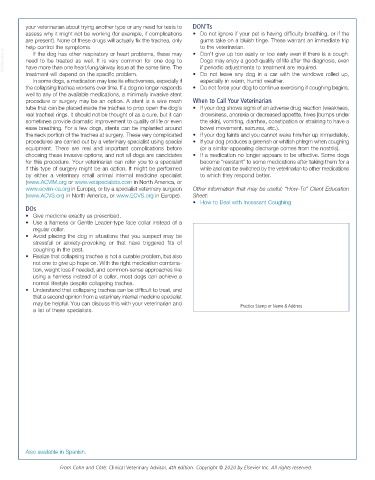Page 2965 - Cote clinical veterinary advisor dogs and cats 4th
P. 2965
your veterinarian about trying another type or any need for tests to DON’Ts
assess why it might not be working (for example, if complications • Do not ignore if your pet is having difficulty breathing, or if the
are present). None of these drugs will actually fix the trachea, only gums take on a bluish tinge. These warrant an immediate trip
to the veterinarian.
help control the symptoms. • Don’t give up too easily or too early even if there is a cough.
VetBooks.ir need to be treated as well. It is very common for one dog to Dogs may enjoy a good quality of life after the diagnosis, even
If the dog has other respiratory or heart problems, these may
if periodic adjustments to treatment are required.
have more than one heart/lung/airway issue at the same time. The
treatment will depend on the specific problem. • Do not leave any dog in a car with the windows rolled up,
In some dogs, a medication may lose its effectiveness, especially if especially in warm, humid weather.
the collapsing trachea worsens over time. If a dog no longer responds • Do not force your dog to continue exercising if coughing begins.
well to any of the available medications, a minimally invasive stent
procedure or surgery may be an option. A stent is a wire mesh When to Call Your Veterinarian
tube that can be placed inside the trachea to prop open the dog’s • If your dog shows signs of an adverse drug reaction (weakness,
real tracheal rings. It should not be thought of as a cure, but it can drowsiness, anorexia or decreased appetite, hives [bumps under
sometimes provide dramatic improvement to quality of life or even the skin], vomiting, diarrhea, constipation or straining to have a
ease breathing. For a few dogs, stents can be implanted around bowel movement, seizures, etc.).
the neck portion of the trachea at surgery. These very complicated • If your dog faints and you cannot wake him/her up immediately.
procedures are carried out by a veterinary specialist using special • If your dog produces a greenish or whitish phlegm when coughing
equipment. There are real and important complications before (or a similar-appearing discharge comes from the nostrils).
choosing these invasive options, and not all dogs are candidates • If a medication no longer appears to be effective. Some dogs
for this procedure. Your veterinarian can refer you to a specialist become “resistant” to some medications after taking them for a
if this type of surgery might be an option. It might be performed while and can be switched by the veterinarian to other medications
by either a veterinary small animal internal medicine specialist to which they respond better.
(www.ACVIM.org or www.vetspecialists.com in North America, or
www.ecvim-ca.org in Europe), or by a specialist veterinary surgeon Other information that may be useful: “How-To” Client Education
(www.ACVS.org in North America, or www.ECVS.org in Europe). Sheet:
• How to Deal with Incessant Coughing
DOs
• Give medicine exactly as prescribed.
• Use a harness or Gentle Leader-type face collar instead of a
regular collar.
• Avoid placing the dog in situations that you suspect may be
stressful or anxiety-provoking or that have triggered fits of
coughing in the past.
• Realize that collapsing trachea is not a curable problem, but also
not one to give up hope on. With the right medication combina-
tion, weight loss if needed, and common-sense approaches like
using a harness instead of a collar, most dogs can achieve a
normal lifestyle despite collapsing trachea.
• Understand that collapsing trachea can be difficult to treat, and
that a second opinion from a veterinary internal medicine specialist
may be helpful. You can discuss this with your veterinarian and Practice Stamp or Name & Address
a list of these specialists.
Also available in Spanish.
From Cohn and Côté: Clinical Veterinary Advisor, 4th edition. Copyright © 2020 by Elsevier Inc. All rights reserved.

